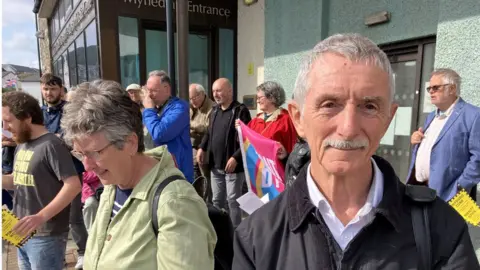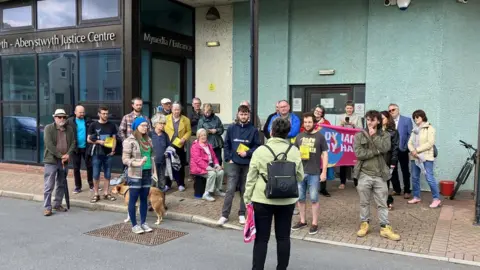Llangrannog: Welsh speaker wins English-only parking fine case
 BBC
BBCA lawsuit has been thrown out against a Welsh-language campaigner who refused to pay a parking ticket because it was written in English.
Toni Schiavone was fined £70 by One Parking Solution in Llangrannog, Ceredigion, in September 2020.
The penalty was thrown out in May 2022 when the company failed to appear in court.
At a new hearing on Friday, the judge at Aberystwyth Justice Centre called the company's application flawed.
Mr Schiavone, who is a member of Welsh language campaign group Cymdeithas yr Iaith, refused to pay the fine because the penalty notice and following letters from the company were not in Welsh.
He was forced to make a third appearance in court as One Parking Solution continued attempts to get the payment from him through a lawsuit.
In a bilingual hearing, Deputy District Judge Owen Williams said the application had been made on the basis of a rule that did not apply to small claims.
He told Richard Mullan, One Parking Solution's barrister, that he had been badly advised by the company's lawyer.

The court ordered One Parking Solution to pay Mr Schiavone's travel expenses of £27.90, which he said he would donate to a cancer charity.
"It's a shame that I have to go to court to fight something as petty as this," he said after the hearing.
"It costs less to translate a letter into Welsh than it cost the prosecution to come here to fight this case," he added.
"The fact that this company is so keen to chase me... instead of preparing something completely simple like giving a letter in Welsh shows a lack of respect for the Welsh language and to Wales."
Hundreds of non-Welsh car parks
Cymdeithas yr Iaith launched a campaign in response to the case, encouraging people not to pay parking fees in car parks that do not display bilingual signs.
The group's chair, Sian Howys, said: "There are hundreds of these private car parks throughout Wales and on the whole these companies are not willing to use the Welsh language."
"Welsh is an official language in Wales, and these companies make a big profit," she said. "They are happy enough to take the money of the people of Wales but they refuse to use our language.
"So we are launching a campaign where people will be able to put a warning in the car saying that they are not going to pay for parking until the company operates in Welsh."
She called on the Welsh government to set Welsh language standards that apply to all companies operating in Wales, including banks and supermarkets.
After the hearing, a Welsh government spokesperson said: "We are keen to see all sectors increase the use of Welsh and supporting businesses to develop their Welsh language services is a priority for us.
"As a government, we are focused on action that has a meaningful and practical effect on promoting the Welsh language and ensuring that people are able to use Welsh in their everyday lives.
"As part of this, we are currently following a programme of work for the introduction of Welsh language standards to more sectors over the coming years."
